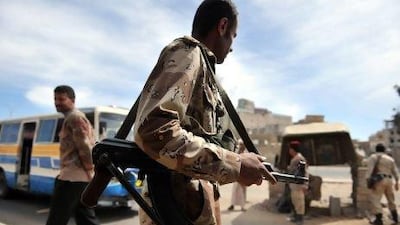SANAA // The remaining relatives of the former Yemeni president, Ali Abdullah Saleh, have been removed from the top echelons of the security forces, including a son and a nephew who had more than 100,000 troops under their command.
Decrees issued by Mr Saleh's replacement, Abdrabu Mansur Hadi, dissolved the country's Republican Guard, which was led by Mr Saleh's eldest son, Ahmed.
He also sacked Gen Ali Moshen, the commander of the first armoured division and an enemy of Mr Saleh.
The guards and first armoured division will be absorbed into the country's defence ministry.
Gen Yahya Mohammed Saleh, a nephew of the former president, was also removed as the leader of the country's counterterror unit and central security forces.
The announcement marks a key phase in Yemen's transfer from Mr Saleh's autocratic regime after he was forced to stand down in February following a year of protests, in which factions of the military fought each other on the streets of Sanaa.
The purging of Mr Saleh's relatives from the military's top positions was a key demand from the opposition.
The decrees announced late on Wednesday, were supported by the GCC.
"Restructuring the army is a must," the GCC chief Abdulatif Al Zayani told Mr Hadi in a phone call, congratulating him on the steps "tied to implementing the Gulf initiative ... and UN Security Council resolutions," Saba state news agency reported.
Mr Al Zayani stressed "the support of GCC states for those decisions".
Mr Hadi took power in Yemen less than a year ago, after Mr Saleh stepped down under a power transition agreement mediated by the GCC, following a year-long uprising against his rule.
Ahmed Ali Saleh commanded about 80,000 troops in the guard while Yahya Mohammed Saleh oversaw a force of 64,000. Yahya Mohammed Saleh is now a civilian while Ahmed Ali Saleh will remain in the military, although it was unclear what his rank would be.
Yemen's armed forces will now be restructured to include four components: ground forces, navy, air force and border guards.
Gen Mohsen, who led troops against Mr Saleh during the uprising, but maintained critics in the current government who say he is too powerful, said he accepted the move. He also said those relieved from their duties should help rebuild Yemen's military.
"No one should oppose the military reforms," said Gen Mohsen.
Abdulsalam Mohammed, the director of Abaad Strategic Centre, a think tank in Sanaa, said the sackings put an end to any dreams Mr Saleh had of coming back to power.
"It's an era that passed and will not comeback," he said.
Mr Saleh was forced out of power in February after 33 years in rule. But he remains in Yemen and his presence has raised worries with factions taking part in the National Dialogue Conference that he would try to derail political progress. The conference, set up under the power transfer deal, is meeting to discuss constitutional reforms that would lead to elections for president and parliament in 2014.
Under the power transfer deal, Mr Saleh was granted immunity for violations committed during his time in power but was not barred from political involvement. He remains the leader of the party he founded and currently the country's largest, the General People Congress.
"We refused involvement in the political process or national dialogue if the Saleh family was still in control of Yemen's military," said Saber Bamashmoos, a youth activist in Sanaa who protested against the Saleh family. Mr Bamashmoos, who is taking part in the conference, said Salah loyalists shot him in the right leg while he was protesting and killed three of his friends during the uprising.
"Hundreds of youth activists died in 2010 and they will now rest in peace because the Saleh family is out of both power and the military," he said.
The Joint Meeting Parties, Yemen's largest opposition bloc, said all political factions should support the president as he tries to reform the military. "This is what the people have been waiting for and this day is historical and will be remembered," the JMP said.
Khaled Al Anesi, who joined the protests to remove Ali Abdullah Saleh from power soon after Egypt's revolution, said that while he was pleased about the reforms, more was expected from Mr Hadi.
"We are now seeking justice from those who attacked the Yemeni people and looted their wealth," Mr Al Anesi said.
Nabil Al Soufi, a media adviser for the Saleh family, said the reforms the did not mean the end of Ahmed Ali Saleh's future within Yemen's security forces. "Ahmed Ali will still serve as a military leader and I am confident that he will remain a force in Yemen for years to come."
foreign.desk@thenational.ae

